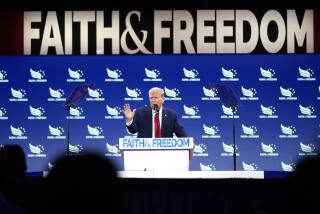The Presidential Approach to Worship : Faith: Occupants of the White House have demonstrated a wide range of interest in religion. Mainstream Protestantism has been predominant.
When George Washington unexpectedly added the words so help me God to the oath of office he took in 1789, he changed history. Those words have been part of the oath uttered by every new occupant of the Oval Office.
But while the oath has been the same, the White House has seen many varieties of religious experience since Washington’s day, even though the vast majority of Presidents have identified with mainstream Protestant denominations.
Some, such as Zachary Taylor, never joined a church or made any public professions of religious belief. Others, such as Jimmy Carter, were solid churchgoers who talked about their faith publicly.
Still others, such as Abraham Lincoln, remain somewhat of an enigma, having made strong religious statements at times but having never formally joined any religious body.
These and other facts about the religious lives of the nation’s 40 Presidents are documented in a book published this month by Westminster/John Know Press.
Taking as his title “So Help Me God: The Faith of America’s Presidents,” author John McCollister provides a brief faith profile of each President.
“Our country was founded as a God-centered nation,” McCollister says in his introduction, noting that carrying on that tradition is one of the President’s “herculean burdens.”
“In a sense, it’s a no-win situation,” he said. “The President who seldom attends public worship is branded an infidel; the President thought to attend too often is accused of ‘parading’ his religion.”
The nation’s first President, we learn, was an Episcopalian throughout his life but held “a conspicuous silence” on specifics of his faith and was believed by many to be an agnostic or atheist. When the American Revolution began, he even refused to take Communion in the Episcopal Church to avoid any hint of partiality.
But we are reminded, too, that at his first inauguration in 1789 on the balcony of Federal Hall in New York, Washington added his own words, “I swear, so help me God,” to his oath of office.
Another early President, Thomas Jefferson, frequently worshiped in an Episcopal Church but was not a member of any congregation and did not believe in the deity of Christ.
Nevertheless, Jefferson believed in the value of religion.
McCollister recounts a story about Jefferson crossing a field carrying a large red prayer book. He was approached by a man who, laughing, said, “Why Mr. President, you don’t believe a word of it.”
Jefferson replied, “Sir, no nation has yet existed or been governed without religion. I, as chief magistrate of this nation, am bound to give it the sanction of my example.”
John Quincy Adams was a Unitarian and read at least three chapters of the Bible every day. Yet some representatives of organized religion branded him an atheist because he did not speak in terms familiar to them.
Ironically, despite his love of Scripture, Adams may have been the only U.S. President ever to take the oath of office without a Bible, according to McCollister’s research.
James Madison was one of the few Presidents to have considered entering the ministry as a career. He never did become a clergyman, but it is believed that he read books on theology for relaxation throughout his adult life.
Madison was also known as a staunch defender of the 1st Amendment’s call for separation of church and state and was so outspoken on the subject that some of the conservative Calvinists of the day labeled him “anti-church.”
The only Roman Catholic ever to serve as president was John F. Kennedy, whose Catholic ties created great controversy about his loyalties.
But Kennedy won over even his strongest critics when he said, “I believe in an America where separation of church and state is absolute, where no Catholic prelate would tell the President how to act, and no Protestant minister would tell his parishioners for whom to vote.”
Kennedy was cautious about going to confession, according to McCollister, for fear that he would be recognized. In at least one incident his fear was justified. McCollister said Kennedy was once greeted in the confessional by a priest who said, “Good evening, Mr. President.”
Kennedy responded, “Good evening, Father,” and promptly left.
Choosing where to worship while in the White House has proven to be a delicate matter for Presidents hopeful of not offending anyone.
Jimmy Carter, who was well known as an active Southern Baptist layman, had a hard time finding a church in Washington that was not only to his liking but also “acceptable” to the mainstream of American society--one with a Baptist flavor but without the air of a camp meeting revival.
He settled on a Baptist church headed by a pastor known to have an appreciation for liturgical worship while at the same time having a reputation as a devoted Southern Baptist.
One President who tapped into a wide range of religious traditions was Richard Nixon. When he was at the retreat on Key Biscayne in Florida, Nixon frequently attended a Presbyterian church.
But back at the White House he established a system in which prominent clergymen from various denominational backgrounds rotated through the White House from Sunday to Sunday, preaching to 300 or more people gathered in the East Room.
In contrast to his predecessor, Ronald Reagan, George Bush is “not shy about attending public worship,” according to McCollister.
Bush, a staunch Episcopalian, is a conservative in a generally liberal denomination.
Seven other Episcopalians also served in the White House, the highest number from any single denomination. Six Presidents were Presbyterians.
More to Read
Get the L.A. Times Politics newsletter
Deeply reported insights into legislation, politics and policy from Sacramento, Washington and beyond. In your inbox three times per week.
You may occasionally receive promotional content from the Los Angeles Times.










